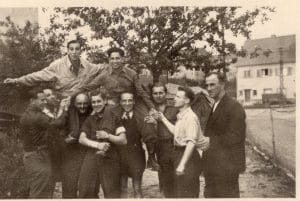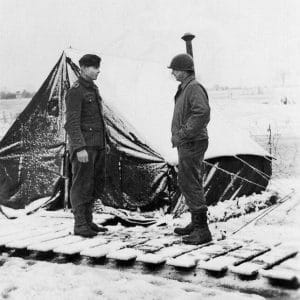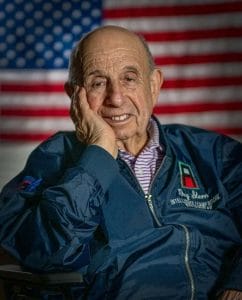Born in Germany to a Jewish family, Stern loved to read. But as Nazis rose in power, his parents feared for his safety and arranged for him to live with an aunt and uncle in St. Louis, Mo. “You have to be like invisible ink,” his father told him. “You will leave traces of your existence when, in better times, the invisible ink will become visible again.” While waiting for the paperwork to clear, his parents pulled him out of high school, where he was being bullied for being Jewish, to study English with a tutor. He traveled to the U.S. alone: his parents couldn’t afford to go themselves, or even send his younger brother and sister.

In high school, a girlfriend suggested he change his given name; he dropped Günther for Guy. Once he graduated from high school in St. Louis, Stern worked to get funds to go to college, studying languages at Saint Louis University. But he interrupted his own education in 1942 to volunteer as an intelligence officer in the U.S. Navy. It rejected him: he wasn’t born in the U.S. He instead became a U.S. citizen and entered the U.S. Army, which recognized his potential: in 1944 they sent him to special training at Camp Ritchie in Maryland, becoming one of the “Ritchie Boys”, a group of around 20,000 soldiers fluent in foreign languages trained in frontline interrogation, battlefield intelligence, investigation, counter-intelligence, and other intelligence work. At least 2,200 of them were Jewish; around 200 were women. After training he was sent to Europe for D-Day as a member of Team 41, a six-man group Interrogators of Prisoners of War. Stern did well: he was promoted to head of his team, and prepared reports on what he had learned from prisoners, ranging from the German railroad system to German preparations for chemical warfare.

Stern and another German-born Ritchie Boy, Fred Howard, used a “good cop, bad cop” tactic that brought out more information, including about a German captain in the Battle of the Bulge who uncovered two Ritchie Boys there from IPW Team 154. The officer declared “Juden haben kein Recht, in Deutschland zu leben” (“Jews have no right to live in Germany”), ordered them to stand at attention, and had them shot in the back. That was a war crime: the captain, Curt Bruns, was the first German officer to be executed by the U.S. Army for World War II war crimes. Was that tough for Stern? “We were fighting an American war, and we were also fighting an intensely personal war,” he said in a 2005 interview. “We were in that war with every inch of our being.” Another tactic was to pretend to be a Russian Commissar, using a fake Russian accent he remembered from the Eddie Cantor comedy radio show. “We didn’t break everyone,” he wrote in his 2020 memoir, Invisible Ink.* “Some of our captives may have reflected on the impossibility of transporting prisoners across half a continent to face the feared Russians. But mostly the stratagem worked.” Stern was awarded the Bronze Star for his intelligence activities, its citation crediting him with providing information of “inestimable value.”

After the war, Stern went to Hildesheim, his home town, to discover his family home had been taken by the Nazi government in 1938, and his family sent to the Warsaw Ghetto. He never saw them again. He returned to the U.S. and went back to school with the help of the G.I. Bill, culminating in a PhD at Columbia University. After several teaching positions he became a professor and department head for German language and literature at the University of Cincinnati, and then Wayne State University. After retirement Stern became the director of the Harry and Wanda Zekelman International Institute of the Righteous at the Holocaust Memorial Center in Farmington Hills, Mich., a position he held until his death. He was also named a Knight of the Legion of Honor for freeing France during the war, and recognized as an honorary citizen of Hildesheim. He appeared in the 2004 documentary, The Ritchie Boys, and was featured in the 2022 Ken Burns documentary, The U.S. and the Holocaust. Dr. Stern, one of 25-30 surviving Ritchie Boys, died December 7 at a hospital in West Bloomfield, Mich. He was 101.
